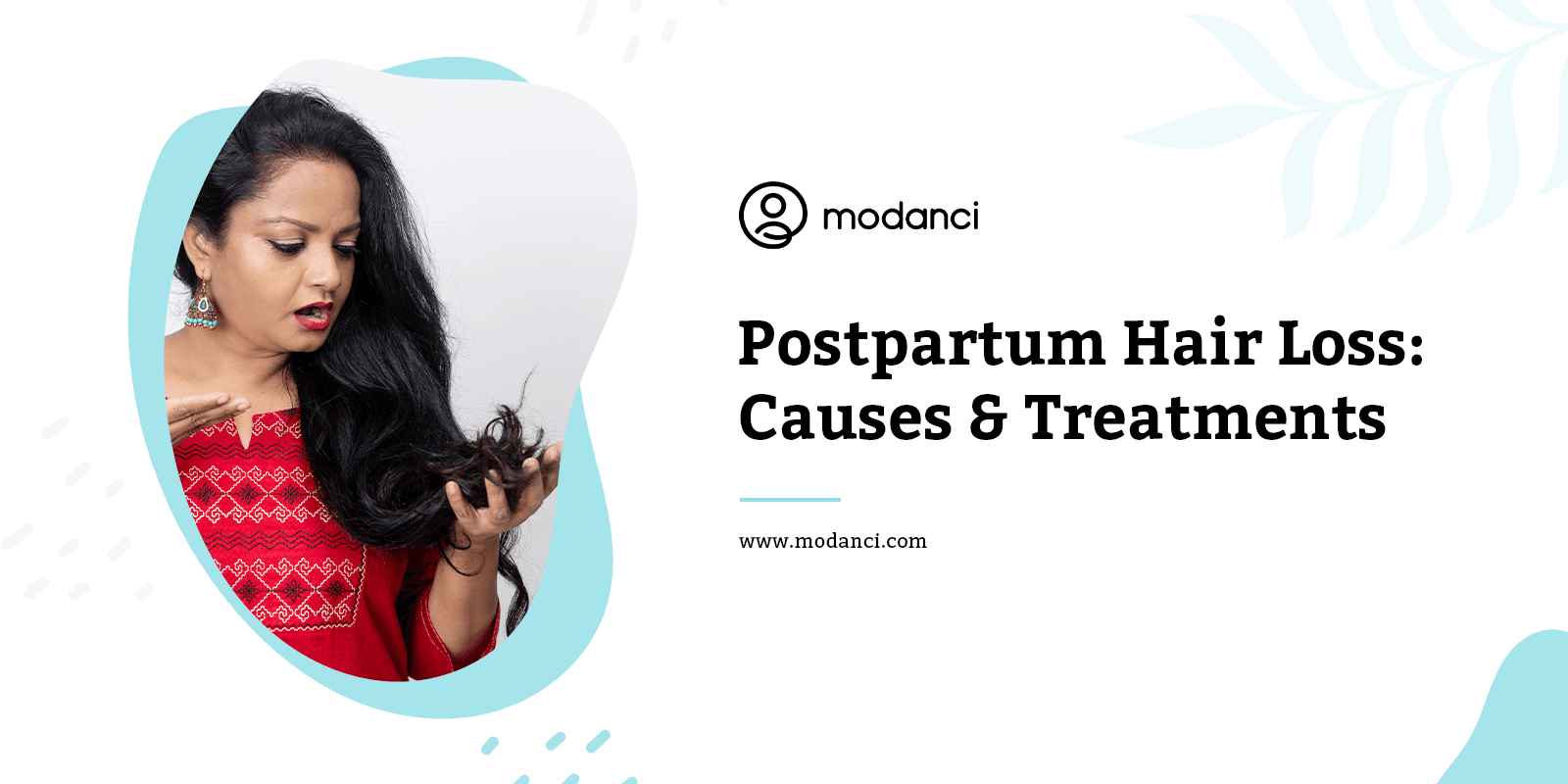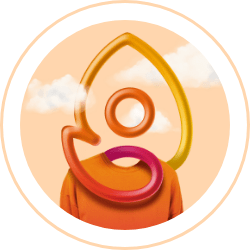Postpartum hair loss is a typical problem that starts about three months after childbirth and can persist for up to six months. It is a specific and transient aspect of pregnancy. Your hair will often regrow to its previous fullness. Your hair undoubtedly grew in quicker than usual during pregnancy. Still, a few months after giving birth, you most likely realised it was falling out, perplexing you about what was happening.
From its causes to whether it can be avoided, this article will tell you everything you need to know about postpartum hair loss.
What is Postpartum Hair Loss?
Postpartum hair loss, also known as postpartum alopecia, is a common condition that affects many women after giving birth. During pregnancy, hormonal changes cause more hair follicles to remain in the growth phase, resulting in thicker and fuller hair. However, hormone levels shift dramatically after childbirth, causing hair follicles to enter a resting phase and shed. This shedding usually occurs three to six months after delivery and can continue for several months.
Postpartum hair loss can be a distressing experience for new mothers, as they may notice excessive shedding and thinning of their hair. It is essential to understand that this hair loss is a temporary and regular part of the postpartum period. The hormonal changes and the natural hair growth cycle returning to its normal rhythm are the primary causes of postpartum hair loss.
What are the Causes of Postpartum Hair Loss?
Postpartum hair loss, also known as postpartum alopecia, is primarily caused by hormonal changes after childbirth. During pregnancy, increased estrogen levels prolong the growth phase of the hair cycle, resulting in thicker and healthier hair. However, hormone levels, particularly estrogen and progesterone, rapidly decline after giving birth, leading to hair follicles entering a resting phase.
The hair follicles in the prolonged growth phase during pregnancy now enter the telogen (resting) phase, leading to increased hair shedding. The sudden drop in hormones triggers what is known as telogen effluvium, a type of temporary hair shedding. This shedding typically occurs between three to six months postpartum, although the exact timing can vary for each individual.
In addition to hormonal changes, other factors can contribute to postpartum hair loss. Nutritional deficiencies, such as low iron levels, can affect hair health and increase shedding. The physical stress of pregnancy and childbirth and the emotional stress of adjusting to motherhood can also play a role in postpartum hair loss. It’s important to note that postpartum hair loss is temporary, and most women will see their hair return to its pre-pregnancy thickness within a year or so.
What are the Treatments For Postpartum Hair Loss?
Postpartum hair loss is a common occurrence that many women experience after giving birth. It can be distressing to see excessive hair shedding, but the good news is that in most cases, the hair loss is temporary and resolves independently.
However, if you’re looking for natural ways to support hair regrowth and minimise postpartum hair loss, there are several treatments you can try. These treatments focus on nourishing the hair follicles, promoting scalp health, and supporting overall hair growth.
1. Nutrient-Rich Diet
A balanced diet promotes hair health. Focus on healthy foods rich in vitamins, minerals, and proteins, such as leafy greens, fruits, lean meats, eggs, and legumes. Omega-3 fatty acids found in salmon and walnuts also benefit hair growth. Consider incorporating foods high in biotin, such as sweet potatoes and avocados, as biotin deficiency can contribute to hair loss.
2. Scalp Massage
Massaging your scalp can stimulate blood circulation and promote hair growth. Massage your scalp with circular motions for a few minutes each day. Consider incorporating coconut or almond oil for nourishment and relaxation.
3. Herbal Remedies
Some herbs and botanicals have been traditionally used to support hair health and growth. Consult with an Ayurvedic vaidya to explore herbal remedies suitable for your needs. For example, fenugreek seeds can be soaked overnight and ground into a paste for the scalp. Aloe vera gel can also be used to soothe and nourish the hair follicles.
4. Stress Management
High-stress levels can contribute to hair loss. Managing stress through relaxation techniques like yoga, meditation, and deep breathing exercises can help minimise the impact of stress on hair health. Getting enough sleep and prioritising self-care can also support overall well-being and promote hair regrowth.
It’s important to note that while these natural treatments can be helpful, it’s always recommended to consult with an ayurvedic physician, especially if you have any underlying health conditions or concerns about your postpartum hair loss. They can provide personalised advice and guidance based on your specific situation.
Conclusion
Your postpartum hair loss is typically wholly natural and not cause for concern. While it can be alarming to see large amounts of hair falling out, it is essential to remember that hair loss is temporary, and most women will experience regrowth within a few months. After your child turns one year old, if you still notice clumps in your hairbrush, consult an Ayurvedic Physician to ensure your hair loss isn’t due to something else.
Modanci’s Potensified Ayurvedic Solution For Hair Growth And Maintenance is curated by Ayurvedic doctors with 85 years of combined experience to help combat postpartum hair loss and promote hair growth. The kit includes a Handcrafted Organic Jatamansi Kokum Shampoo Conditioner Bar, an Ayurvedic Hair Oil, Nasya Oil, and Hair Tablets. Answer a few questions and discover personalised solutions for achieving strong and lustrous hair!
FAQs
1. What helps postpartum hair loss?
Some natural home care therapies easier to cure, which include a nutrient-rich diet, scalp massage, herbal remedies, and stress management
2. What triggers postpartum hair loss?
Falling estrogen levels can be a trigger point for postpartum hair loss, which is the reason for excessive shedding. After giving delivery, estrogen levels decrease (return to pre-pregnancy levels), causing the hair follicles to enter the resting phase and produce fewer hairs.
3. Can breastfeeding cause hair loss?
Hair loss tends to be more intense after delivery and while nursing. Shifting hormone levels bring on the shedding. Reduced estrogen levels cause hair to appear thinner or to shed more frequently. People frequently experience severe shedding or hair loss during breastfeeding and postpartum.
4. Does postpartum hair loss stop after breastfeeding?
Hair is usually regressed within the first year after giving birth. Thus, postpartum hair loss is only temporary. The loss of hair after giving birth has no cure. No need to freak out! It would help if you had made strides by the time your child turns one. Hair loss typically lasts for three months after it begins and should then start to diminish.
Read More:




